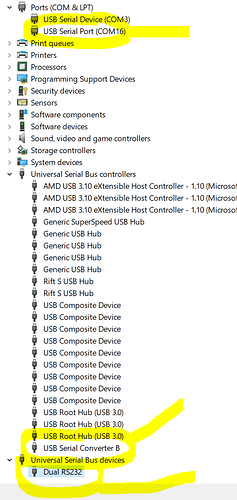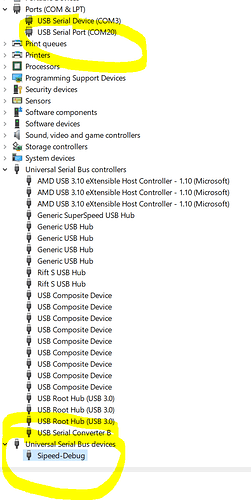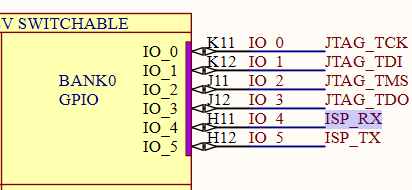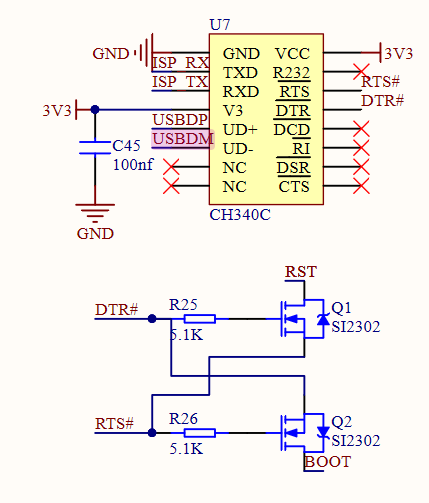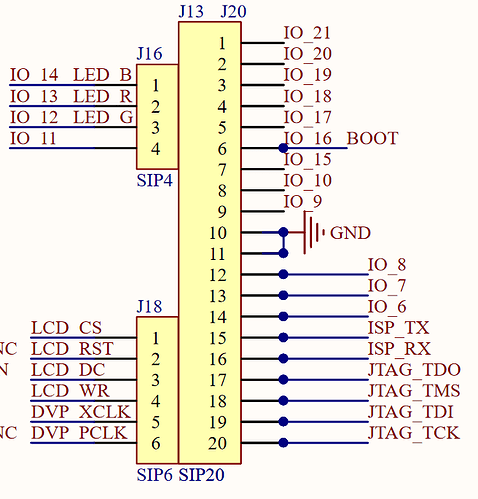Hi,
I am trying to upload and debug with a brand new Sipeed RV USB Debugger on a Maix Bit device. But its failing to upload on windows with Visual Studio Code. can someone please advise, thanks
I followed the instructions on using Zadig to get the device setup, and now it looks like this is DM
The error is
** Programming Started **
embedded:startup.tcl:476: Error: ** Programming Failed **
in procedure 'program'
in procedure 'program_error' called at file "embedded:startup.tcl", line 532
at file "embedded:startup.tcl", line 476
*** [upload] Error 1
Processing sipeed-maix-bit (platform: kendryte210; board: sipeed-maix-bit; framework: kendryte-standalone-sdk)
------------------------------------------------------------------------------------------------------------------------------------------Verbose mode can be enabled via `-v, --verbose` option
CONFIGURATION: https://docs.platformio.org/page/boards/kendryte210/sipeed-maix-bit.html
PLATFORM: Kendryte K210 (1.2.4) > Sipeed MAIX BiT
HARDWARE: K210 400MHz, 6MB RAM, 16MB Flash
DEBUG: Current (iot-bus-jtag) External (iot-bus-jtag, jlink, minimodule, olimex-arm-usb-ocd, olimex-arm-usb-ocd-h, olimex-arm-usb-tiny-h,
olimex-jtag-tiny, sipeed-rv-debugger, tumpa)
PACKAGES:
- framework-kendryte-standalone-sdk 0.5.6
- tool-kflash-kendryte210 0.9.1
- tool-openocd-kendryte 1.203.1 (2.3)
- toolchain-kendryte210 8.2.0
LDF: Library Dependency Finder -> http://bit.ly/configure-pio-ldf
LDF Modes: Finder ~ chain, Compatibility ~ soft
Found 0 compatible libraries
Scanning dependencies...
No dependencies
Building in release mode
Checking size .pio\build\sipeed-maix-bit\firmware.elf
Advanced Memory Usage is available via "PlatformIO Home > Project Inspect"
RAM: [ ] 0.5% (used 31432 bytes from 6291456 bytes)
Flash: [ ] 0.3% (used 57966 bytes from 16777216 bytes)
Configuring upload protocol...
AVAILABLE: iot-bus-jtag, jlink, kflash, minimodule, olimex-arm-usb-ocd, olimex-arm-usb-ocd-h, olimex-arm-usb-tiny-h, olimex-jtag-tiny, sipeed-rv-debugger, tumpa
CURRENT: upload_protocol = sipeed-rv-debugger
Uploading .pio\build\sipeed-maix-bit\firmware.bin
_ __ _ _
| |/ /___ _ __ __| |_ __ _ _| |_ ___
| ' // _ \ '_ \ / _` | '__| | | | __/ _ \
| . \ __/ | | | (_| | | | |_| | || __/
|_|\_\___|_| |_|\__,_|_| \__, |\__\___|
|___/
Kendryte Open On-Chip Debugger For RISC-V v0.2.3 (2019-02-21)
Licensed under GNU GPL v2
debug_level: 1
ftdi samples TDO on falling edge of TCK
adapter speed: 1000 kHz
riscv.cpu
Core [0] halted at 0x8000a96e due to debug interrupt
** Programming Started **
embedded:startup.tcl:476: Error: ** Programming Failed **
in procedure 'program'
in procedure 'program_error' called at file "embedded:startup.tcl", line 532
at file "embedded:startup.tcl", line 476
*** [upload] Error 1
======================================================= [FAILED] Took 1.94 seconds =======================================================The terminal process "C:\Users\marcu\.platformio\penv\Scripts\platformio.exe 'run', '--target', 'upload', '--environment', 'sipeed-maix-bit'" terminated with exit code: 1.
Terminal will be reused by tasks, press any key to close it.
My platformio.ini is
[env:sipeed-maix-bit]
platform = kendryte210
board = sipeed-maix-bit
framework = kendryte-standalone-sdk
monitor_speed = 115200
board_build.mcu = K210
; change MCU frequency
board_build.f_cpu = 400000000L
upload_protocol = sipeed-rv-debugger
